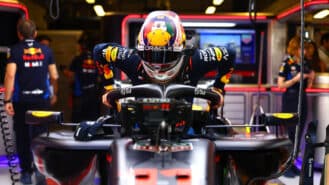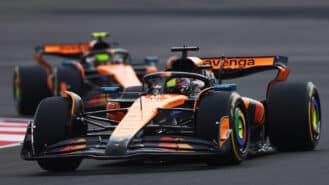
Does Red Bull's Lawson debacle vindicate Perez?
You could argue Sergio Perez has done his reputation a lot of good by not being on the Formula 1 grid this year. The Mexican was often criticised during his…
In her blog this week ‘Does Formula 2 get your vote?’, Gillian Rodgers and some of the comments from readers have hit on a key point about the sorry state of international single-seater racing’s ‘ladder system’. The absurdly confused jumble of formulae that now exists in place of the old system of F1, F2, F3 and Formula Ford surely is one of the FIA’s biggest failings. The old ladder system thrived for a few decades but was subverted by the easy acceptance of a plethora of manufacturer-driven spec-car formulae by the FIA and many other national sanctioning bodies.
Some will argue that it’s a crime against the sport, but most everyone who’s been around motor racing for any period of time will shrug their shoulders and remark, ‘That’s motor racing’s way of doing business.’ And I guess they’re right.
Still, well do I remember a season I spent in the UK almost 40 years ago helping my friend David Loring run his Merlyn FF1600 in the three leading British Formula Ford championships of those days. Back then the ladder system was very clear, and after winning four FF1600 championships in the United States and Canada in 1971, Loring was anxious to race Formula 3 in Britain and Europe. But financial realities meant he had to race Formula Ford, which was a bit of a letdown.

Some bad luck and a few accidents strained our budget even more and David was disappointed to finish the year with ‘only’ five wins, one track record (at Mallory Park) and sixth in the primary British Oxygen FFord championship. Still, it was a great pleasure and a tremendous learning experience for us both to enjoy a season in the UK when the old system was at its height.
David ran more than 30 races that year and close to half of them were on the same card as an F3 race. Another four or five accompanied F2 rounds (in addition to a roaring European F2 championship there was a British F2 series in ‘72 won by Niki Lauda) and three times we raced at F1 races (in those days there were half a dozen non-championship F1 races in England).

The point is that there was a clearly defined ladder from Formula Ford through to F1 and there was also a real fan following for F2, F3 and FF1600. It was very clear who the up-and-coming stars were and people were anxious to see how the new boys would do each year in the next step on the ladder to F1. Guys like Emerson Fittipaldi and Jody Scheckter made their names in Formula Ford and F3, just like Jim Clark had done a decade earlier in Formula Junior and F2.
I cannot help believe that it would be a great thing for the sport to recreate a new version of the old system and many fans seem to believe the same thing. But there’s no impetus or enough desire within the sport’s political structure to make it happen, is there?

You could argue Sergio Perez has done his reputation a lot of good by not being on the Formula 1 grid this year. The Mexican was often criticised during his…

Big questions hang over F1 Fantasy choices for the 2025 Japanese GP. Here are our predictions; tips on drivers to avoid; which chips to play and further analysis

Formula 1 travels to Suzuka for the third round of the 2025 season. Here are the main questions ahead of the Japanese Grand Prix

Yuki Tsunoda has explained the performance level Red Bull is demanding as he joins the F1 team — and says that he will be allowed to beat Max Verstappen if he's quick enough